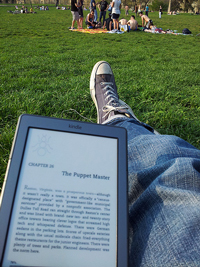Sometimes, it seems that we have become too accustomed to skipping mechanical rules (such as spelling, capitalization, and punctuation) because we use text messaging so much of the time. However, knowing when to capitalize letters and when to leave them lowercase is important. If an employer is looking at the résumés of two job applicants, and one is filled with mechanical errors, the employer will probably think more highly of the error-free résumé.

Source: Reading in the park, Andre Goerres, Flickr
You are going to read another passage from the New York Times, but this time you will be looking for errors in capitalization. Ritch Duncan’s article “Smart Moments Won’t Go Viral” discusses whether the intelligence of the human race is decreasing.
Now, read the article. When you come across a drop-down menu in your reading, choose the correctly capitalized word from the list. You may use grammar-check software if it's available on your computer. This resource won't always help with correcting capitalization errors, but you are free to use it.

Did you remember that specific names of people, places, and things are capitalized, while general nouns are not? Did you also remember something you learned when you first began writing: to always capitalize the first word of a sentence?
Think of capitalization this way: Correct capitalization will contribute to your writing. It may be tempting when texting and e-mailing to let capitalization rules slide, but just remember that in academic writing, an error-free text is expected and looks impressive.